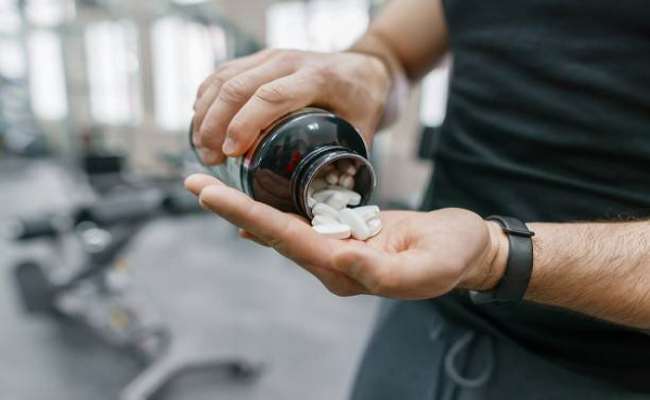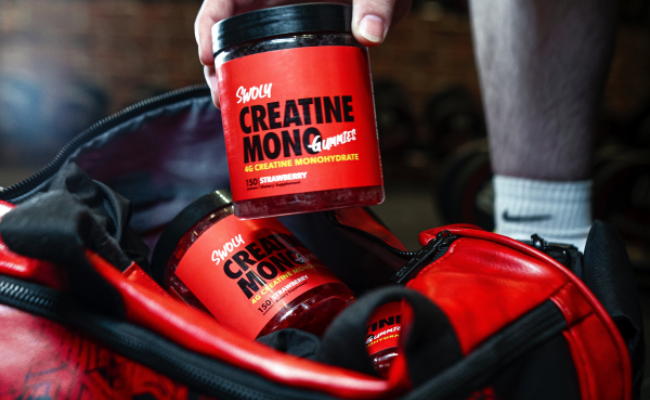When improving performance in fitness and sports, many supplements claim to increase strength, endurance, and muscle growth. One of the most researched and widely used supplements in this category is creatine. Many in the fitness community regard it for its proven benefits and scientific support.
Whether you are an athlete aiming for peak performance or someone who regularly goes to the gym to maximize gains, creatine supplements can be a great way to enhance physical performance.
To make the most of creatine and address any concerns about side effects, it’s important to understand how it works. In this article, we will delve deeper into the world of creatine supplements, explore their notable health benefits, and shed light on any potential side effects that may occur.
What Is Creatine?
 Creatine is a natural substance found in small amounts in various protein-rich foods such as meat and fish. The human body produces it, primarily in the liver, kidneys, and pancreas.
Creatine is a natural substance found in small amounts in various protein-rich foods such as meat and fish. The human body produces it, primarily in the liver, kidneys, and pancreas.
However, the amount of creatine you get from diet alone may not be sufficient to meet the increased demands of intense exercise or athletic performance. That’s where creatine supplementation can be beneficial.
Remember that creatine is a type of amino acid that plays a crucial role in the energy supply within our cells, particularly during high-intensity, short-duration activities like weight training or sprinting. It serves as a rapid source of energy by replenishing adenosine triphosphate (ATP), the molecule responsible for delivering energy to your skeletal muscle when you flex it.
How Does Creatine Work?

Muscle fibers are an important component of our skeletal muscles and play a crucial role in muscle contraction and overall muscle function. When taking creatine, it can have an impact on muscle fiber characteristics and performance.
During high-intensity exercise, adenosine triphosphate (ATP) is rapidly consumed, leading to fatigue. However, creatine phosphate can donate its phosphate molecule to adenosine diphosphate (ADP), quickly regenerating ATP and delaying fatigue. This compound allows you to push through those extra reps or sprint that extra distance.
Benefits of Creatine
The general benefits of this fitness supplement are no different from the benefits creatine provides for athletes. Here are a few benefits you get from creatine supplements:
Increased Muscle Strength and Power
The primary advantage of creatine supplementation is its notable impact on muscle strength and power. Scientific evidence has consistently shown that creatine can enhance strength gains. Thanks to these gains, healthy individuals can lift heavier weights during resistance training and perform better in explosive movements like jumping or sprinting.
Enhanced Exercise Performance
In addition to increased strength, research has shown creatine can help improve exercise performance. It enables individuals to sustain high-intensity activities for longer periods, leading to greater training adaptations and potential gains in muscle and body mass.
Increased Muscle Mass

Improved High-Intensity Workouts
Creatine is particularly effective for activities that require short bursts of intense efforts, such as weightlifting, sprinting, or high-intensity interval training (HIIT). This energy boost and delayed fatigue from creatine helps young adults push harder and achieve better results in these types of workouts.
Faster Recovery

Improved Brain Function
Studies have shown that when you take creatine supplements it can increase brain phosphocreatine levels, which is the storage form of energy in the brain. This may improve the brain’s ability to generate ATP and support energy-dependent processes like neurotransmission, cognitive function, and memory.
Research on creatine’s effects on brain function is still ongoing, and the results are mixed. Some studies have reported positive effects on cognitive tasks such as memory, attention, and intelligence. Other studies have not found any significant benefits.
Remember that the effects of creatine on brain function may vary between individuals, and more research is needed to fully understand its potential benefits.
You may also like: Creatine Powder/Creatine Supplements
Different Forms of Creatine
Contrary to popular belief, creatine supplements come various forms, each with its unique characteristics. Here are some common forms you should know about:
Creatine Monohydrate
Creatine monohydrate is the most researched and widely used form of creatine. It is cost-effective, easily available, and highly effective in improving performance and increasing muscle mass.
Creatine Ethyl Ester
Creatine ethyl ester is a form of creatine that some believe has superior absorption properties compared to creatine monohydrate. However, scientific evidence supporting its efficacy is limited, and it may not provide significant advantages over other forms of creatine.
Buffered Creatine
Buffered creatine, also known as Kre-Alkalyn, is marketed as a pH-buffered form of creatine that is less likely to convert into creatinine (a waste product) before reaching the muscles. However, more research is needed to determine its superiority over creatine monohydrate.
Creatine Hydrochloride
Creatine hydrochloride is another supplement form of creatine that claims to offer better solubility and absorption. It is often marketed as a more concentrated form, requiring lower dosages. However, its effectiveness compared to creatine monohydrate is still a topic of debate.
Micronized Creatine Monohydrate
Micronized creatine refers to creatine monohydrate that has undergone a process to break down the compound into smaller particles. This increases its solubility and may improve absorption. Micronized creatine is often preferred for its ease of mixing and reduced risk of stomach discomfort.
While there are various forms of creatine available, creatine monohydrate remains the most extensively researched and widely recommended supplement form of creatine due to its proven effectiveness.
Who Can Take Creatine?
Generally speaking, creatine is safe and can be taken by many healthy adults. However, there are certain categories of people who might find it more beneficial to take creatine supplements:
- Athletes and fitness enthusiasts
- Bodybuilders and weightlifters
- Vegetarians and vegans
- Older adults experiencing age-related muscle loss (sarcopenia)
- Individuals with specific health conditions like muscular dystrophy and Parkinson’s disease
While creatine is generally safe, certain individuals should exercise caution or seek medical advice before using it to avoid experiencing any adverse effects.
Potential Side Effects and Risks of Creatine
Creatine has some common side effects, especially if a person misuses or takes it in high. Here are some common side effects associated with creatine;
Dehydration
Creatine can cause increased water retention within the muscles, leading to dehydration if a user does not maintain adequate fluid intake. Remember to drink plenty of water while taking creatine to prevent dehydration.
Gastrointestinal Distress
In some cases, creatine supplementation can cause gastrointestinal issues such as bloating, diarrhea, or stomach discomfort. To minimize these effects, experts recommend users to split the daily dosage into smaller increments or try a different form of creatine.
Muscle Cramps
Although rare, some individuals may experience muscle cramps while taking creatine. Staying well hydrated and ensuring proper electrolyte balance can help prevent or alleviate muscle cramps.
Weight Gain
Due to water retention in the muscles, initial weight gain is common when taking creatine supplements. However, this is temporary and primarily attributed to increased intramuscular water content rather than fat gain.
Kidney Damage (Myth Dispelled)
There has been a long-standing myth that creatine supplementation can cause kidney disease. However, extensive research has repeatedly shown that creatine is safe for healthy individuals and does not pose a risk to kidney function when used as recommended.
Electrolyte Imbalances
Creatine supplements can disrupt the balance of electrolytes in the body, especially when consumed in excessive doses. Electrolytes such as sodium and potassium are essential for proper muscle growth and nerve function. Electrolyte level imbalance can affect brain health, leading to headaches, fatigue, and seizures.
Interactions with Medications
Creatine may interact with certain medications, such as nonsteroidal anti-inflammatory drugs (NSAIDs) or diuretics. If you are taking any medications, consult with your healthcare provider first before taking creatine.
Remember that individual responses to creatine may vary. To mitigate any potential risks, ensure you use creatine under the guidance of a healthcare professional or a qualified sports nutritionist.
Understanding the Proper Dosage of Creatine
When taking creatine supplements, following the appropriate dosage protocols is crucial to maximize its benefits. The recommended dosage typically involves two phases: a loading phase and a maintenance phase.
Loading Phase
The concept of the loading phase in creatine supplementation refers to a short period of higher dosage at the beginning of creatine use, followed by a maintenance phase with a lower dosage.
Here’s an explanation of why some people follow this method:
Rapid saturation of muscle creatine levels: The primary reason individuals choose a loading phase is to quickly increase the concentration of creatine in their muscles.
Faster performance and strength gains: Some users believe saturating the muscles with creatine through a loading phase helps them experience more immediate improvements in exercise performance, strength, and power.
Typical loading phase protocol: During a loading phase, individuals typically consume 20–25 grams of creatine per day, divided into four to five equal doses, for 5–7 days.
Potential gastrointestinal side effects: It’s worth mentioning that a loading phase, with its higher dosage, can increase the likelihood of experiencing gastrointestinal side effects such as stomach cramps, bloating, or diarrhea. These side effects can be minimized by spreading out the dosage throughout the day and ensuring adequate hydration.
Maintenance Phase
After the loading phase, users typically transition to a “maintenance dose” of creatine. This dose is lower than the loading phase and aims to sustain the elevated muscle creatine levels achieved during the loading phase.
Here’s a quick rundown of the maintenance phase:
Maintenance dose: The maintenance dose of creatine is usually around 3-5 grams per day. This dose is often taken consistently over a more extended period, ranging from a few weeks to months.
Sustaining muscle creatine levels: By taking a lower dose regularly, individuals can sustain these levels without the need for continuous high-dose supplementation.
Approaching long-term use: Creatine is generally considered safe for long-term use when used responsibly and within recommended dosages. Many studies and randomized clinical trials have examined the effects of taking creatine supplements over extended periods, ranging from several weeks to years, without significant adverse effects reported.
Considerations and precautions: While long-term creatine use is generally safe, it is still essential to exercise caution and consider individual factors, especially if you have pre-existing medical conditions or are taking medications that may interact with creatine.
Creatine and Athletes
Creatine is a popular dietary supplement among athletes in many sports to improve athletic performance and increase muscle mass. However, you must understand the legal and banned status of creatine in different sports organizations.
You may also like: How to Choose the Right Vegan Protein Powder
Legal and Banned Status in Sports
Creatine is legal and widely accepted in most sports organizations. It is not considered a banned substance by the International Olympic Committee (IOC), National Collegiate Athletic Association (NCAA), or World Anti-Doping Agency (WADA).
The International Society of Sports Nutrition (ISSN) has recognized creatine as one of the most effective dietary supplements for enhancing athletic performance in activities that require high-intensity, short-duration efforts.
You may also like: Vegan Protein Powder
Use in Different Sports

Studies published in reputable journals, such as the International Journal of Sport Nutrition and Exercise Metabolism, have consistently demonstrated several benefits of taking creatine supplements, including enhanced anaerobic performance, increased training adaptations, and reduced muscle damage.
Conclusion
Creatine is a popular supplement that provides energy to muscles during intense activities. It helps improve muscle strength, power, and exercise performance. While it’s generally safe, some possible side effects include minor stomach issues, water retention, and slight changes in blood pressure.
To use it correctly, start with a higher dose for the first week and then reduce it for maintenance. Remember to consult a professional before starting any new supplement. By understanding creatine and using it responsibly, you can benefit from its potential advantages in your fitness journey.

